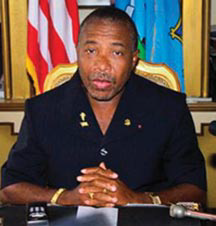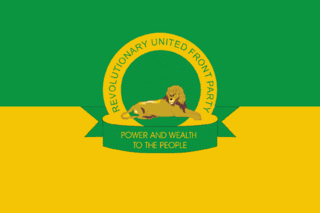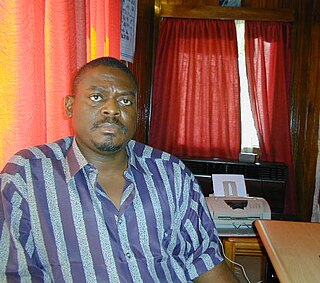Related Research Articles
Universal jurisdiction is a legal principle that allows states or international organizations to claim criminal jurisdiction over an accused person regardless of where the alleged crime was committed, and regardless of the accused's nationality, country of residence, or any other relation to the prosecuting entity. Crimes prosecuted under universal jurisdiction are considered crimes against all, too serious to tolerate jurisdictional arbitrage. The concept of universal jurisdiction is therefore closely linked to the idea that some international norms are erga omnes, or owed to the entire world community, as well as to the concept of jus cogens – that certain international law obligations are binding on all states.

Charles McArthur Ghankay Taylor is a Liberian former politician and convicted war criminal who served as the 22nd president of Liberia from 2 August 1997 until his resignation on 11 August 2003 as a result of the Second Liberian Civil War and growing international pressure.
Guus Kouwenhoven, often misspelled as Gus Kouwenhoven or Guus van Kouwenhoven is a Dutch arms dealer convicted for arms trafficking in Liberia during the presidency of Charles Taylor.

The Revolutionary United Front (RUF) was a rebel group that fought a failed eleven-year war in Sierra Leone, beginning in 1991 and ending in 2002. It later transformed into a political party, which still exists today. The three most senior surviving leaders, Issa Sesay, Morris Kallon and Augustine Gbao, were convicted in February 2009 of war crimes and crimes against humanity.

Major Johnny Paul Koroma was a Sierra Leonean military officer who was the head of state of Sierra Leone from May 1997 to February 1998.
The Sierra Leone Civil War (1991–2002), or the Sierra Leonean Civil War, was a civil war in Sierra Leone that began on 23 March 1991 when the Revolutionary United Front (RUF), with support from the special forces of Liberian dictator Charles Taylor's National Patriotic Front of Liberia (NPFL), intervened in Sierra Leone in an attempt to overthrow the Joseph Momoh government. The resulting civil war lasted 11 years, enveloping the country. It left over 50,000 dead.

The Special Court for Sierra Leone, or the "Special Court" (SCSL), also called the Sierra Leone Tribunal, was a judicial body set up by the government of Sierra Leone and the United Nations to "prosecute persons who bear the greatest responsibility for serious violations of international humanitarian law and Sierra Leonean law" committed in Sierra Leone after 30 November 1996 and during the Sierra Leone Civil War. The court's working language was English. The court listed offices in Freetown, The Hague, and New York City.

Momčilo Perišić is a Serbian former general and politician who served as the Chief of the General Staff of the Armed Forces of Yugoslavia between 1993 and 1998.
Moinina Fofana is a Sierra Leonean former military commander who was the leading general in the Kamajors militia and director of the Civil Defence Forces (CDF) during the Sierra Leone Civil War. He was considered to be one of the leaders of the CDF, like Samuel Hinga Norman and Allieu Kondewa.
Mohamed Yahya Sillah is a Sierra Leonean politician, journalist and human rights activist. He was active in the transition efforts from military to civilian rule in Sierra Leone. As the National Chairman of the National Alliance Democratic Party (NADP), he was an unsuccessful candidate in the 1996 Presidential elections.
George Gelaga King was a judge in Sierra Leone, West Africa, and recently a justice of the Special Court for Sierra Leone.

Abdul Aziz One Mohammed was military governor of Borno State, Nigeria, and later was leader of the ECOMOG peacekeeping force in Liberia and Sierra Leone.

Liberia – Sierra Leone relations refers to the historical and current relationship between Liberia and Sierra Leone. The two countries signed a non-aggression pact in 2007 when Sierra Leonean President Ernest Bai Koroma took office. In January 2011, an African diplomat described relations as "cordial".

United Nations Security Council Resolution 1688, adopted unanimously on June 16, 2006, after recalling all previous resolutions on the situation in Liberia, Sierra Leone and West Africa, including resolutions 1470 (2003), 1508 (2003), 1537 (2004) and 1638 (2005), the Council approved the transfer of former Liberian President Charles Taylor to the Special Court for Sierra Leone which was moved to The Hague in the Netherlands, due to security concerns.
Alieu Kosiah is a former commander of the United Liberation Movement of Liberia for Democracy (ULIMO) faction, a rebel group that participated in the First Liberian Civil War (1989–1996) which fought against the National Patriotic Front of Liberia, led by Charles Taylor. After the war, Kosiah moved to Switzerland, where he obtained permanent residence.
Alain Werner is a Swiss human rights lawyer, specialized in the defence of victims of armed conflicts, founder and director of Civitas Maxima (CM), an international network of lawyers and investigators based in Geneva that since 2012 represents victims of mass crimes in their attempts to obtain justice.
Hassan Bility is a Liberian journalist, and the founder and Director of the Global Justice and Research Project (GJRP), a non-governmental organization dedicated to the documentation of war time atrocities in Liberia and to assisting victims in their pursuit of justice for these crimes.
Kunti Kamara, a.k.a. Kunti Kumara, Kunti K., Colonel Kamara, CO Kamara or Co Kamara, whose real name may be Awaliho Soumaworo, is a former Liberian rebel militia commander who participated in the First Liberian Civil War as a leader in the United Liberation Movement of Liberia for Democracy (ULIMO).
Civitas Maxima is a non-governmental organisation that documents mass crimes, such as crimes against humanity, genocide, and war crimes, and pursues justice on behalf of the victims, particularly in West Africa.
References
- 1 2 3 "Liberia war crimes: Rebel commander on trial in Finland". BBC News. 2021-02-03. Retrieved 2021-03-17.
- ↑ "The Massaquoi Affair: Special report on the Judas of Sierra Leone (Part 1)". JusticeInfo.net. 2020-04-07. Retrieved 2021-03-17.
- ↑ "KRP on pidättänyt Sierra Leonen kansalaisen epäiltynä vakavista rikoksista Liberiassa vuosina 1999–2003". Poliisi (in Finnish). Retrieved 2021-03-17.
- ↑ "The Massaquoi Affair: Special report on the Judas of Sierra Leone (Part 2)". JusticeInfo.net. 2020-04-14. Retrieved 2021-03-17.
- ↑ "27 January 2021 - Trial of former Sierra Leonean commander Massaquoi to start in Finland". ICL Media Review. 2021-01-27. Retrieved 2021-03-17.
- ↑ "Liberian history in the making: groundbreaking decision regarding Gibril Massaquoi's trial". Civitas Maxima. 2021-02-01. Retrieved 2021-03-17.
- ↑ "Universal jurisdiction: the Finnish revolution". JusticeInfo.net. 2021-02-01. Retrieved 2021-03-17.
- ↑ "Frustration Shows on Final Day of Massaquoi Hearing Before Court Moves to Liberia". Liberian Observer. Retrieved 2021-03-17.
- ↑ "Liberia: Finnish Court Acquits Massaquoi of War Crimes Charges over Lack of Sufficient Evidence". 2 May 2022.
- ↑ "Liberia war crimes suspect Gibril Massaquoi's trial begins in Finland". Africanews. 2021-02-03. Retrieved 2021-03-17.
- ↑ Colombe Gbane, Nadia (10 January 2023). "Ex-Rebel Gibril Massaquoi tried in court of appeal". Africa News. Archived from the original on 31 May 2023.
- ↑ "Appeal court acquits Sierra Leonean man accused of war crimes". Yle. 1 February 2024.